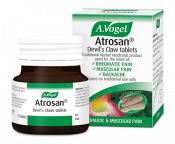Just how healthy are your muscles and joints?
Answer our questions and find out if your flexibility is compromised.
Find out how flexible you areJoint problems such as osteoarthritis and gout are very common. By implementing some easy dietary and lifestyle tips we can start to get the symptoms under control. I reveal what kind of things can promote healthy joints in this blog.
If you experience a joint-related issue, here are a few tips you can implement to help keep the joints healthy:
Read on to find out a bit more about why these things can help your joints.
Inflammation is the main thing to consider when it comes to diet and joint health. Fresh, unprocessed foods that aren't likely to trigger inflammation should be the priority.
Meanwhile, white flour, white pasta, white sugar and caffeine have a tendency to cause inflammation so try to avoid these in favour of brown varieties of pasta and rice. Limit refined sugar intake and experiment with alternatives such as Sweet Freedom or coconut blossom sugar. You could also opt for a caffeine-free drink like Bambu or a herbal tea.
Meat can also be inflammatory, whereas fish and vegan forms of protein are not as irritating. You could aim to go 'veggie' for at least one day a week to help get more of these ingredients in your diet.
Don't rely heavily on dairy products if you're prone to joint problems like arthritis. When there is an overload of calcium in the diet, the body can struggle to absorb it correctly, especially in the absence of sufficient vitamin D. Calcium absorption can also be hindered by lack of magnesium so a focus on this nutrient is helpful.
Magnesium-rich foods:
|
A common issue to affect the joints is gout. This is caused by a build up of uric acid which settles in the small joints of the hands and feet instead of being flushed out by the kidneys. It causes pain and swelling in the joints, as well as reduced mobility.
Dietary factors can play a big part in the development of gout. Over-processed diets full of meat, dairy, alcohol, salt, sugar and caffeine can all lead to problems. At the same time, including too few alkalizing foods (tofu, fruit, vegetables, legumes, nuts, seeds) and drinking too little water will cause issues with gout.
A little niggle in the joints here or there may benefit from topical application of Arnica, to help calm the discomfort. This is also a very good option if you've had a bump or a minor injury to the joint (as long as the skin is not broken!).
However, for longer term issues you may want to think about using Devil's Claw. This is a herbal remedy that reduces inflammation without any of the problems associated with either steroid or non-steroidal anti-inflammatory medications. It can be used long or short-term and is not commonly associated with any side effects. It is not contraindicated with other medication and is available as a tincture or tablets.

"Easy to take and have noticed some relief after a few weeks of taking"

Water is really the best drink for joint issues. With gout, in particular, upping your water intake, alongside drinking some nettle tea, can help to get rid of uric acid.
To make your own nettle tea, snip the top off young nettle plants and steep in boiling water for 5 minutes before removing the nettles. Failing that, nettle tea is widely available in health stores and supermarkets.
For those in need of a stronger effect, nettle tincture is also available.
Improve mobility and flexibility by making your body move on a regular basis. Movement is also very good for issues like stiffness and pain, plus it can reduce the likelihood of weight gain – a key contributing factor in knee problems, in particular.1
Check out the kinds of activities that are a little bit friendlier on the joints.
If you already experience joint pain, heat can be really beneficial. It relaxes much tension and can help considerably with different types of pain. A warm bath or heat pack are good options but also remember to keep wrapped up warm when you head outside and ensure your home is toasty too!
 Looking for a solution to help relieve symptoms such as muscle and joint pain, backache, rheumatic pain and lumbago?
Looking for a solution to help relieve symptoms such as muscle and joint pain, backache, rheumatic pain and lumbago?
Buy now from your local store.
“I have used these for several years and would not wish to be without them.”![]()
To find local independent stores in your area that sell Atrosan Devil’s Claw tablets, simply type your postcode below.

Answer our questions and find out if your flexibility is compromised.
Find out how flexible you areAs the A. Vogel Muscles and Joints advisor, I recommend Atrogel® for the effective relief from aches and pains.
Learn moreYour gut could be to blame for your joint pain! New studies have found potential links between the 'bad' bacteria in the digestive tracts and certain types of joint pain!
Is your gut to blame?Discover the story of Alfred VogelNature is just about the best thing we’ve got!